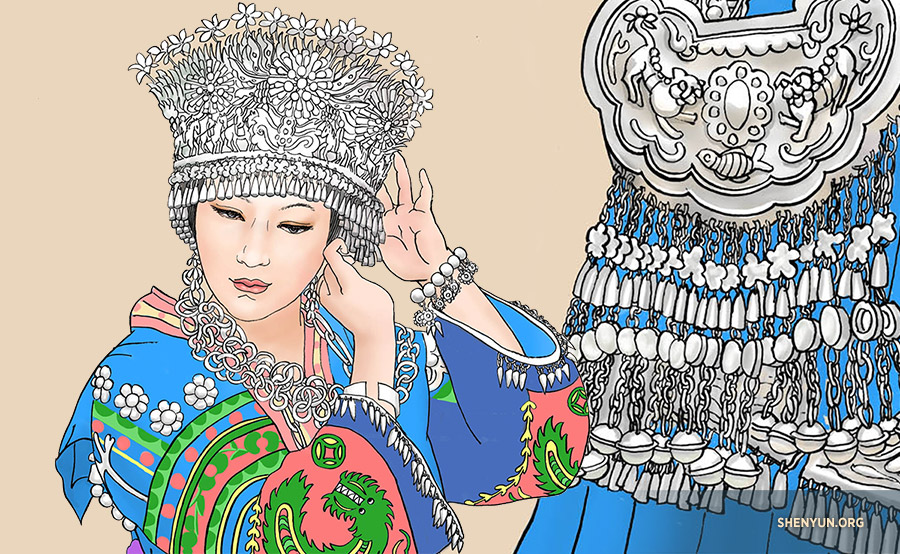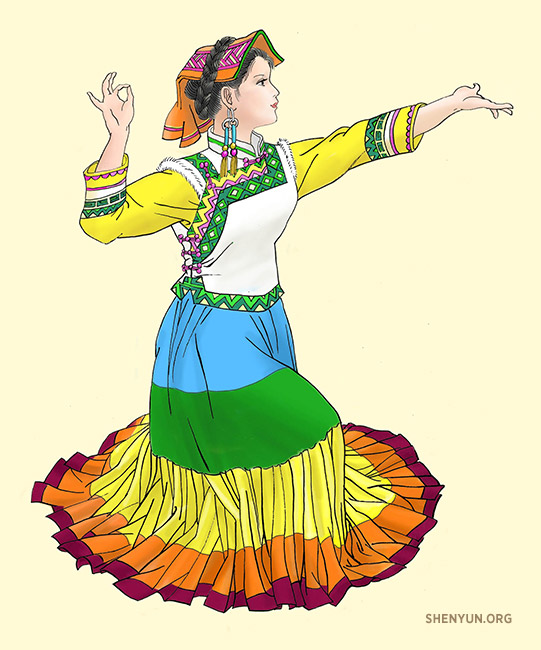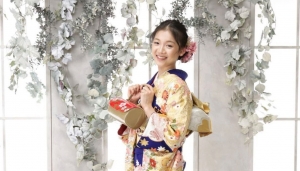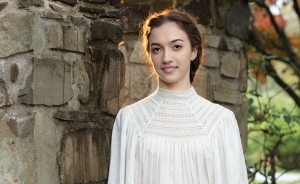
Accessories Inspired by Ethnic Fashions
Ethnic traditions have long played an important role in fashion—even today, leading designers will journey up high mountains and into deep forests to seek inspiration from indigenous cultures.
But while international travel is currently not a good option, we’d like to take you on a little tour of China’s different regions. You’ll get to know the jewelries and styles of diverse ethic groups and perhaps you’ll even find inspiration for a style that will make you sparkle.
Let’s go!
First Stop - the Yi Ethnic Group

We begin in southwest China, home to the people of the Yi ethnic group. The Yi is an ancient ethnicity that includes many subgroups, each with its own attire.
The style of the Liangshan Yi is the most commonly seen in Shen Yun performances.
Men of Liangshan will often use a black cloth to wrap their head, leaving one end to form a cone shape for decoration.
For ladies, their hairpiece is made of a meticulously embroidered square handkerchief, with their hair braided on top to keep the kerchief in place.
Another specialty of Yi attire is colorful pleated skirts. Back in the day, the pleat was a symbol of social status—the more noble, the more pleated. It has a flared shape and is made of multiple layers of different colored cloth.

You may recall these multihued skirts made an appearance in Shen Yun’s ethnic dance “Charming Ladies of the Yi.” And so, before we continue our ethnic tour, we have a brief stop at our only gift shop along the way:
If you were one of the many audience members who loved these brilliant skirts, be sure to check out the Elegance of the Yi scarf from the Shen Yun Shop—a vibrant and multipurpose accessory; and, from what I understand, one of Shop’s bestsellers.
Second Stop - Tibet

From southwest China we continue further west, and then up about 12,000 feet to the snowy plateaus of the Himalayas (don’t worry, this tour does not include altitude sickness). This is of course home to a people with an ancient history and a glorious culture. We celebrate Tibetan heritage in many of our Shen Yun productions, and would love to be allowed to perform there some day—or anywhere in China, for that matter.
But back to fashion. Hats are very important in traditional Tibetan attire. Normal, everyday outfits alone feature some 20 different types.
Underneath the hats there are many different hairstyles. The kham region of Tibet is famous for theirs. Whereas Tibetan men from other regions often leave their hair down, guys from kham have their long hair braided with yak wool and wrapped around their heads.
As for the ladies of, getting their hair done is never a quick thing in kham… First, you have to weave your hair into tiny little braids, which are then combined into a big braid. They also decorate their hair with precious stones like amber, agate, or turquoise. So, if cornrow is your style, maybe you can try to make it Tibetan-infused next time!
Third Stop - Chinese-Koreans

No, we’re not talking about the country with all the K-pop stars, but one of China’s minority groups. Chinese-Koreans have much in common with Koreans on the peninsula, although their language is slightly different. The Chinese-Korean ethnic group resides mainly in the three provinces of northeast China—Liaoning, Jilin, and Heilongjiang.
The traditional attire of Chinese-Koreans celebrates a simple, timeless aesthetic. For men, the main hairpiece is the gat—a hat with a bamboo frame and a translucent black veil.
Unmarried ladies usually single plait their hair with a colorful ribbon tied at the end. Married women, though, put their hair up into a low bun held with a traditional hair stick. If you want to try this at home, blogger Jade Zhan reminds us not to use a chopstick, “lest your hairstyle becomes the next entrée.”
Final Stop - Miao or Hmong

To wrap up our mini-tour, we travel back south for a visit with the Miao, or Hmong, one of the largest minority groups in China. For the Miao, silver jewelry is an inseparable part of both their culture and traditional attire.
Among the silver accessories women can choose from are the crown, fan, horn, hair stick, flower, comb, lock, and necklace. On formal occasions, a fully adorned Miao woman might carry up to 30lbs of silver jewelry!
The Shen Yun dance “In a Miao Village” is one of the most memorable and delightful pieces of ethnic dance in Shen Yun’s repertoire. It paints a picture of ancient tradition with precisely pleated skirts, flashes of ornate silver jewelry, and delicate embroidery.
***
There are over 50 officially classified minority ethnic groups in China, each with its own unique traditional costumes and jewelry. If you’ve been inspired by the styles of other ethnicities, let us know in the comments below.
Thanks for clicking in and reading, we hope you enjoyed the journey and took some fashion inspiration back home too!

Yuwen Lin
Contributing writer






